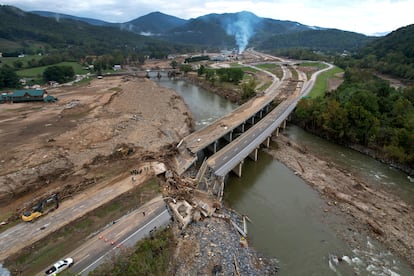Successive hurricanes in southeast US fuel right-wing conspiracy theories: ‘Yes, they can control the weather’
Both Donald Trump and Republican Congresswoman Marjorie Taylor-Green have amplified lies that surfaced on the internet after the impact of Helene

Shortly after the devastating Hurricane Helene made landfall in the southeastern United States, former president and Republican presidential candidate Donald Trump attempted to politicize the disaster with lies, claiming that President Joe Biden was not returning calls from Governor Brian Kemp (a claim that was immediately denied). In response, Biden asked to keep politics out of a tragedy that has left at least 227 dead, according to the most recent figures.
Despite this, various conspiracy theories that have emerged on social media have reached Republican ranks, ranging from false rumors about how disaster funds have been used, to claims that Democratic officials are controlling the weather. The latter has been amplified by Republican Congresswoman Marjorie Taylor Greene, who posted on X on August 3: “Yes, they can control the weather. It’s ridiculous for anyone to lie and say it can’t be done.”
Yes they can control the weather.
— Marjorie Taylor Greene 🇺🇸 (@mtgreenee) October 4, 2024
It’s ridiculous for anyone to lie and say it can’t be done.
Taylor Greene, one of former president Trump’s most ardent supporters, has promoted other conspiracy theories in the past, including some that emerged from the QAnon movement, such as the rumor that space lasers can cause wildfires (in the context of the fires on the west coast and Florida). The Republican congresswoman has more than 1.2 million followers on her X account, some of whom have claimed that the storms have only appeared in red states, and that the hurricanes could affect the Republican vote in the Nov. 5 election.
Within days of the first post, Greene posted a clip from a 2013 CBS News broadcast about experimental efforts to induce rain and lasers that would trigger rain. “Nine years ago, CBS talked about lasers controlling the weather,” she wrote, miscalculating the year in which it was broadcast. The video she shared features physicist and science communicator Michio Kaku talking about the possibility of using lasers to control weather events. However, the man does not mention this as a fact, but rather as a future possibility. Although scientists have experimented with “cloud seeding” to cause rain to occur, these techniques are not large enough to control a hurricane.
Lasers..
— Marjorie Taylor Greene 🇺🇸 (@mtgreenee) October 6, 2024
CBS, 9 years ago, talked about lasers controlling the weather.
pic.twitter.com/DfKX3JVWx2
In the mid-20th century, the federal government experimented with Project STORMFURY, a program intended to weaken hurricanes by seeding them to enlarge their eyewalls and thereby reduce their intensity. However, the results were inconclusive, and ethical issues arose when researchers realized that enlarging the size of a storm would actually endanger more people who had not previously been in danger. Other impractical ideas, such as cooling hurricanes with icebergs or dropping nuclear bombs into storms, were also proposed but discarded due to their ineffectiveness and potential risks, including radioactive fallout.
Modern geoengineering efforts focus on broader climate interventions rather than specific weather phenomena. One promising concept is solar geoengineering, which involves releasing aerosol particles into the atmosphere to reflect sunlight and cool the planet. While computer models show its potential, scientists acknowledge its risks and the ethical dilemmas involved. There is concern that debate over such interventions could lead to real-world experimentation, with potential unintended negative consequences. Most experts agree that geoengineering should complement, rather than replace, efforts to reduce greenhouse gas emissions as a primary strategy for mitigating climate change, which has been singled out as a primary cause of hurricane intensity and unpredictability.
Kristen Corbosiero, a professor of atmospheric and environmental sciences at the University at Albany, told Fortune magazine: “If we could control the weather, we would not want the kind of death and destruction that’s happened.”
Sign up for our weekly newsletter to get more English-language news coverage from EL PAÍS USA Edition
Tu suscripción se está usando en otro dispositivo
¿Quieres añadir otro usuario a tu suscripción?
Si continúas leyendo en este dispositivo, no se podrá leer en el otro.
FlechaTu suscripción se está usando en otro dispositivo y solo puedes acceder a EL PAÍS desde un dispositivo a la vez.
Si quieres compartir tu cuenta, cambia tu suscripción a la modalidad Premium, así podrás añadir otro usuario. Cada uno accederá con su propia cuenta de email, lo que os permitirá personalizar vuestra experiencia en EL PAÍS.
¿Tienes una suscripción de empresa? Accede aquí para contratar más cuentas.
En el caso de no saber quién está usando tu cuenta, te recomendamos cambiar tu contraseña aquí.
Si decides continuar compartiendo tu cuenta, este mensaje se mostrará en tu dispositivo y en el de la otra persona que está usando tu cuenta de forma indefinida, afectando a tu experiencia de lectura. Puedes consultar aquí los términos y condiciones de la suscripción digital.









































